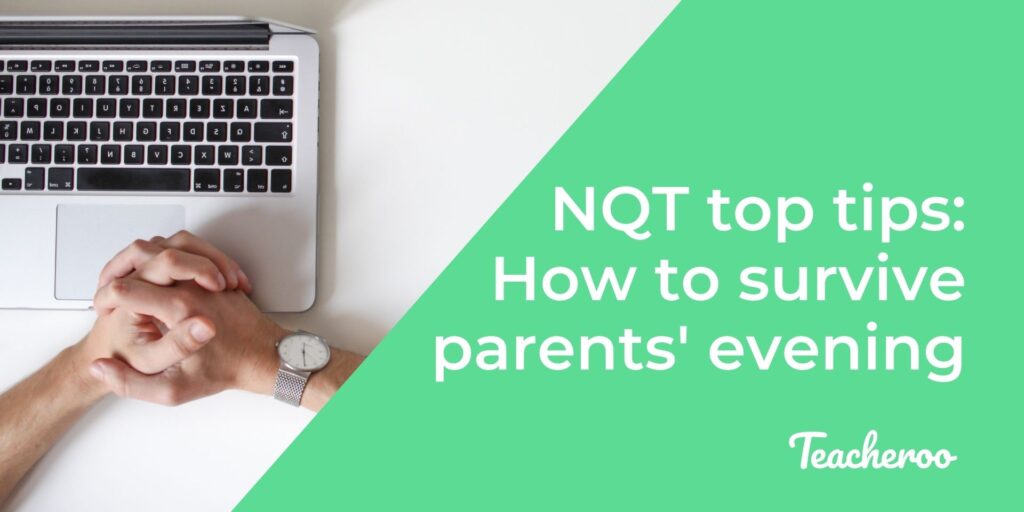Communicating with parents can be one of the most challenging areas of your NQT year (and beyond). Parents are much harder to read than their children and can often be unpredictable in their responses to you. These tips for parents’ evening will help you to feel in control, whilst putting the parent at ease. A winning situation for both parties.
Be polite and keep your body language open
Welcome the parent into the room with a smile and the offer of a handshake. Keep your head up and don’t bring your hands across your body. This will portray confidence to the parents and allow them to have confidence in you.
Think about your seating (and its position)
Try and avoid having a seat of power. If possible you and the parents should be sitting on the same sized chair. It helps to create a feeling of equality for all. Remember some parents may have ‘hang ups’ from their own school experience and it is important that they feel at ease and valued in the discussion. When positioning the meeting space in the classroom, make sure you can see the door at all times and try and avoid the parents blocking your exit from the classroom, just in case. (I’ve never had to make a run for it before, but then there is always a first time!). Oh and make sure you can see a clock.
Keep to time
This is one of those easier said than done tips. Some parents will feel that being at a parents’ evening is like a night out away from the kids and may be reluctant to head home.
It is important for you, to make sure you get home at a reasonable hour, and for other waiting parents, that you stick to time as much as possible. Some schools ring a bell every 10 minutes, most don’t. Keeping sight of a clock will help. I always used to move it to the wall behind the parent so I could see it. Sometimes I would put my watch on the desk.
Most parents respect the time frame for the meeting but some will want to take up residence in your classroom. After the 3rd time of hearing about how the parent is recovering from a bladder infection, saying “Thank you so much for coming” whilst standing up and holding out your hand for a handshake is enough to get most parents up and out. On the other hand, if there is something important that does need to be discussed in more detail then it would be good practice to say something like “I can see this is going to take longer than 10 minutes for us to discuss properly. Let’s make an appointment to talk again so we can give it the time it needs”. Most parents will respect that and you can give them the time without clock watching.
Find out what they want to know early on
Most parents just come to hear what you have to say. I always start by thanking them for coming and then asking “Do you have any particular questions or areas you wanted to discuss this evening?” Most will respond with, “No, I just want to know how they are getting on” at which point you can launch into the points you wanted to discuss. However, if they do have specific queries, it means you can get their priorities addressed early on, rather than you speaking for 10 minutes to find they whip out a notebook full of questions. Parents should always have the opportunity to discuss areas as they are raised, but addressing their concerns first, will ensure they walk away with answers to the questions they came with.
Develop your active listening
Most parents have a concern, and some will wait for parents’ evening to raise it. Create equity in the discussion by checking your understanding of what the parent means. Paraphrasing back can be a hugely powerful way of doing this. Phrases like “So what you are saying is… am I right?” and “I can see how… would make you feel…, what do you feel would help the situation?” You wouldn’t want to do this after every question they ask, at risk of sounding like a parrot! But with key concerns it can be hugely beneficial and will help parents to feel heard and acknowledged
Be prepared
If there is specific support or activities you would like parents to do with their children at home, have the resources ready. It gives you time to talk through them. Parents naturally want to support their children, they don’t always have the confidence in how to do that in the ‘right’ way.
Never give ‘that’ parent the last slot
There will be that one parent who feels by aiming for the last slot of the session they have you captive. Always try and put someone else after them to help them keep to time. If you have control of the timetabling of the slots, you may want to carefully consider where you place each parent. You may need to put separated families on different nights, spread out the more challenging parents or get them all done in the one evening.
Planning carefully will help.
Let the head know when your challenging parents are booked in
Head teachers can be very good at ‘just popping in’ to bring you a drink or a biscuit at key points. If there is a parent you are concerned about, speak to the head about co-ordinating the two events. Just knowing they are popping in and you can smile if things are going ok, or invite them to sit down if you need support can give you a greater feeling of confidence.
Keep notes private
If you decide to make notes or want to share test scores or predicted grades with children, write them down in a notebook with each child on their own page. Parents are eagle-eyed and want to know how their child compares to others. Minimise this by not having a class list with everyone’s information on and only having their child’s information visible.
Parents often hear what they want to
I never forget sitting with a parent and saying “Your child is not keeping up with where we’d like him to be at this point in the year. He is becoming more confident with reading, but cannot recognise enough sounds to be able to move on to the next reading band. In maths, he can recognise numbers to 10 but at this point in the year we would like him to be able to recognise numbers to 20 confidently. He has some brilliant ideas in his writing, but is reluctant to record his ideas and because he is not secure with enough sounds, he can find it hard to communicate in his writing”. The parent’s response “So he’s doing ok then?” I was in a job share at this point, we just looked at each other in disbelief. Perhaps we had been too positive, perhaps we had not reinforced clearly the expectations for the end of year 1.
Most parents want to hear how well their child is doing and sometimes this is all they focus on. If you need to deliver a challenging message about a child’s progress, make sure you do celebrate what they can do, but have those support materials on hand to guide parents in how they can help with the gaps. I am an eternal optimist and always want to start with the positives. I find that summarising at the end with a few key points reinforcing the areas that children find challenging is beneficial. For example, “He is doing really well with his maths, but if you could use these flash cards with him at home to help him develop his sight vocabulary it would really help and we can start to get him back on track with his reading.”
Enjoy it and be confident on the outside (if not on the inside!). Just remember, parents can be nervous too.
Parents’ evening is an opportunity to celebrate what the children can do, but also for parents to share their thoughts and concerns. There will be some children’s parents you will meet for the first time that evening. In 17 years I have been surprised by some parents, praised by others, confronted by a few. But in 99% of cases parents’ evenings are a really positive experience.




